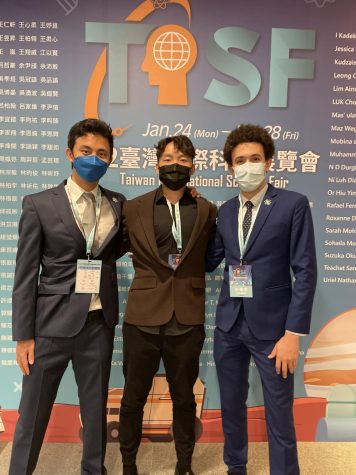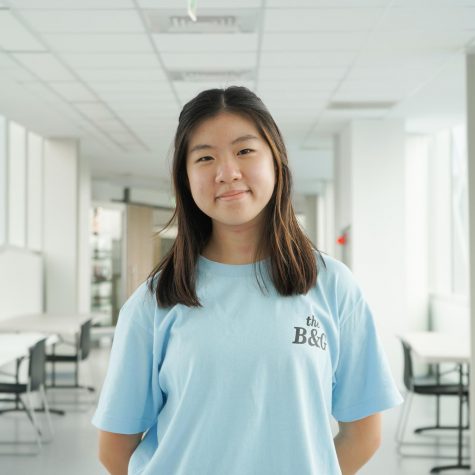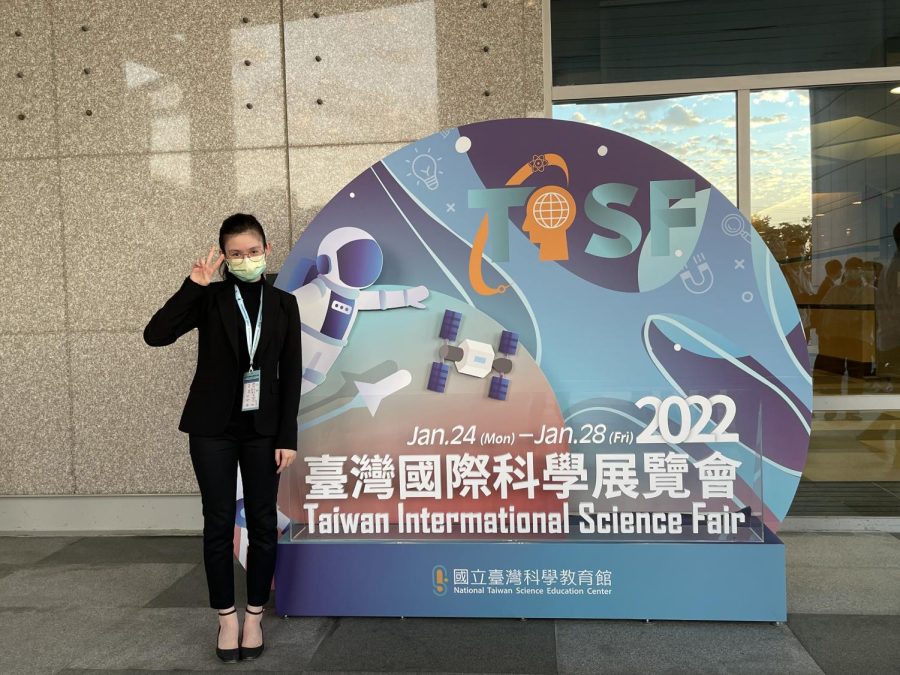4 TAS students qualify and win awards at the Taiwan International Science Fair
Veronica K. (‘23) poses for a photo at the Taiwan International Science Fair. “It really amazed me seeing everyone’s hard work,” she said.
Four Taipei American School (TAS) students qualified and won awards at the Taiwan International Science Fair at the Shilin Science Museum from January 24 to 28. Veronica K. (‘23) presented her individual research on the application of machine learning in art and placed third in her category. Jeffrey Y. (‘23), Ethan D. (‘23) and Dylan L. (‘23) shared their research on finding ways to treat antibiotic-resistant bacteria.
Veronica K. (‘23) – Applications of machine learning in art
In her sophomore year, Veronica completed the Advanced Placement Computer Science course and discovered her passion for programming. During the summer of 2021, she wanted to continue her interest and learn more about artificial intelligence. “It took a lot of independent research,” Veronica said. She discovered generative models and analyzed their specific application in art. “Generative models are usually only used for natural images and everyday photos, so I thought ‘why can’t we move this application to artwork?’” Veronica said.
At the fair, Veronica was stationed at her poster and presented her project to a panel of judges. “I was not really nervous because I felt like I had already done everything I could up to that point, so I just tried my best,” Veronica said. She also enjoyed meeting others who were also passionate about their research. “It really amazed me. You meet a lot of people in your field as well so you have a lot of things to talk about.”
However, completing the research project on her own was not easy. “The hardest part for me was probably time management,” Veronica said. Since she had only just learned to program the year before and had to prepare her project within a few months, the timeline felt rushed. “Some of the people I met at the fair had been preparing their project for 2-3 years.”
She also had to do a lot of coding on her own. One term that programmers use is “debugging,” which describes the process of finding an issue within your code and meticulously going through it to find the problem. “I had to do a lot of debugging. But once the bug is solved, you feel really happy,” she said. Veronica noted that the experience solidified her ambition to pursue a career in STEM.
Ethan D. (‘23), Dylan L. (‘23), and Jeffrey Y. (‘23) – Researching a new drug to treat antibiotic-resistant bacteria
Ethan, Dylan and Jeffrey also presented their group research project at the International Science Fair. “We were researching a new drug to treat antibiotic-resistant bacteria,” Ethan said. A lot of bacteria build up a resistance to common antibiotics so we need to produce more new drugs that can treat those infections.”
They used a software called “AutoDock” to digitally test which substrates could block an enzyme called LpxC, a specific enzyme that when blocked, kills bacteria. “We made thousands of modifications and ran thousands of tests to try and find the one that inhibited the production of the enzyme the best,” Ethan said.
The hardest part of the whole experience for them was speaking in front of the professors. “They grilled us on questions. I think we maybe underestimated the questions a little bit,” Ethan said.
“We… underestimated our competitors too,” Jeffrey said. Similar to Veronica’s experience, they met groups that have been working on their projects for years. “We said we worked on the project for like six months but we actually only worked on it for like a month,” Jeffrey said.
“We had no idea that we were going to make it through to the finals,” Jeffrey said. “Then we did and we had to step on it and make a video and do a bunch more work,” Ethan said. Fortunately, most of the work for their project was able to be completed virtually without a lab.
Despite the challenges they faced, it was a meaningful event for the team. “We realized it was a pretty fun experience,” Jeffrey said. In fact, the team signed up for another regional fair taking place this month.


Annie is a junior at Taipei American School. She is originally from Seattle, Washington and came to Taipei in 8th grade. She is passionate about dance,...


![Sofia Valadao [Erin Wu/The Blue&Gold]
Erin Wu [Annabelle Hsu/The Blue&Gold]](https://blueandgoldonline.org/wp-content/uploads/2025/05/erin-sofia-pic-600x450.png)
![Dr. Simeondis, Mr. Anderson. [Annabelle Hsu/The Blue&Gold]](https://blueandgoldonline.org/wp-content/uploads/2025/05/teachers-600x338.jpg)
![[PHOTO COURTESY OF UNCULTURED, JUNIPER AND CO.]](https://blueandgoldonline.org/wp-content/uploads/2025/05/student-businesses-600x338.png)
![Photo of the girl's varsity badminton team [PHOTO COURTESY OF TAS ATHLETICS]](https://blueandgoldonline.org/wp-content/uploads/2025/05/BadmintonTeam-04839-600x338.jpg)
![The Institute for Speech and Debate, now based all across the east coast of the US. [PHOTO COURTESY OF MR. WILLIAMS]
Mr. Morris' various ceramic artwork. [PHOTO COURTESY OF MR. MORRIS]](https://blueandgoldonline.org/wp-content/uploads/2025/05/Untitled-design-1-600x459.png)